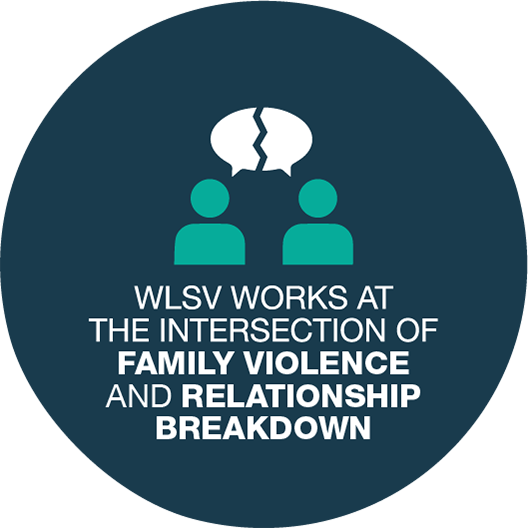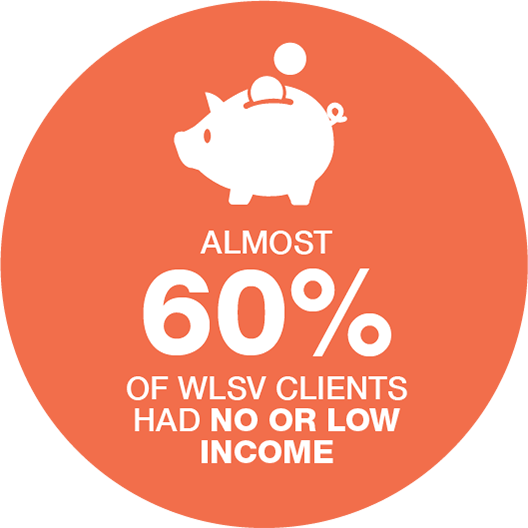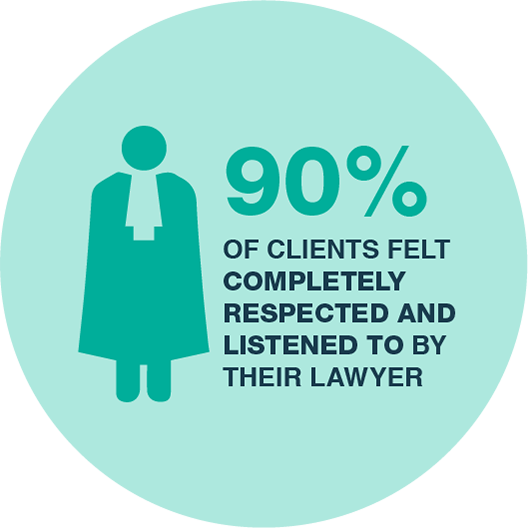Women’s Legal Service Victoria’s 2017/2018 Impact report
Women’s Legal Service Victoria (WLSV) has been making a difference in women’s lives since 1982. Over that time we have grown from being a phone advice and referral service provided by a small group of dedicated volunteer lawyers to being a major social change organisation with nearly 40 staff, 60 volunteers and a wide range of programs.
In 2017/2018, we continued to:
- Represent disadvantaged women across Victoria – providing legal advice, representation in court and running complex cases from start to finish
- Support women with related issues through our in-house financial counsellor and social worker
- Advocate for law and policy that respects and promotes the rights of women
- Provide training and professional development so that women’s legal issues are identified early and responded to appropriately.
We also started important new work to prevent violence against women.
All of our work is directed towards challenging the legal, social and economic structures that disadvantage women, with a focus on preventing and responding to legal issues arising from relationship breakdown or violence.
Breaking new ground in education and engagement
Our education and engagement team began this financial year with a new strategy, reflecting a commitment to working across the full spectrum of violence prevention – from primary prevention of violence against women to building the capacity of the response sector.
The new education and engagement strategy builds on more than two decades of work with community sector workers to improve their capacity to identify legal need and respond appropriately. Read more here.
A key part of the new strategy is to expand our education and engagement work into the area of primary prevention of violence against women.
Legal services generally respond to women after violence has occurred. Primary prevention or stopping violence before it occurs requires cultural, attitudinal and systemic change regarding gender inequity, rigid gender roles and violence supportive beliefs. This meant that we needed to re-think who we needed to engage with – and how.
Drawing on the world-leading work of Australia’s national prevention organisation, Our Watch, we concluded that rather than looking “out there” (to our clients or the wider community) we needed to start with us – to work with the legal and justice workforce to foster environments in our organisations and institutions that are gender equal and non-violent.
In May of this year we learned that we had been successful in securing funding for our Starts with Us project, which is the first of its kind in the legal and justice space. WLSV is leading collaborative action planning to prevent violence against women in the sector through Starts with Us, which you can read more about here.
Planning for impact through systemic advocacy
The great strength of WLSV’s systemic advocacy work – seeking changes to law and policy for the benefit of women – lies in our on-the-ground experience representing disadvantaged women. Our work across the four most significant jurisdictions for women experiencing relationship breakdown or violence (family violence protection, family law, child protection and victims of crime assistance) enables us to identify the priority areas for reform that will have the most impact for disadvantaged women.
Four key policy and law reform priority areas were identified by WLSV staff this year through a series of interactive workshops. Informed by the stories of the women we support, our team identified where we could have the greatest impact at a systemic level. The areas identified were: police accountability, child protection, economic wellbeing and family law, with specific reform goals chosen and prioritised for each.
Our top priorities for 2018/19 include:
- Influencing police practice to address the growing problem of women being misidentified as the primary aggressor of violence. Read more here.
- Removing the barriers for disadvantaged women to be able to access family law property settlements by improving access to superannuation and streamlining the legal process. Read more here about our Small Claims Large Battles report, which highlighted the need for these and other changes to enable disadvantaged women to exercise their rights to a fair division of property.





